- Home
- Jim Kjelgaard
We Were There at the Oklahoma Land Run Page 11
We Were There at the Oklahoma Land Run Read online
Page 11
CHAPTER ELEVEN
_Alec Comes_
In the middle of the following afternoon Alec appeared on a hillock. Hewas driving Pete's horses and wagon with two of his father's muleshitched on behind, and following Sim Macklin, who drove his brother'swagon.
Without benefit of saddle or bridle, Cindy leaped on Sparkle. Guidingthe roan pony with her knees, holding herself on by wrapping one hand inhis mane, she raced to meet her brother. She waved to Sim and drew inbeside Alec.
"Hi!" she called happily.
"Hi." Alec grinned.
"Was Mother worried?"
"About you?" Alec sniffed. "Huh! She was hoping you'd stay lost!"
"Alec!" Cindy begged. "Please tell me!"
"Well," Alec said, "she was a mite worried. But I found out the day youleft that you were with Dad. Mother isn't worried any longer."
"How is Mindy?" Cindy pursued.
"Ha! You know what that crazy girl did? When you weren't there to takeMr. Brent's message, she took it. But she didn't know Thunder's anoutlaw, so she rode him bareback. Can you imagine that?"
Cindy asked anxiously, "Was she hurt?"
"With Mindy, Thunder's gentle as a kitten," Alec assured her. He grinnedagain. "She wore some of my old jeans and a shirt for the ride, and nowshe wears them all the time."
Cindy got to the next important detail. "Did you bring food?" she askedeagerly.
"Yup."
"What kind?"
"Potatoes," Alec said.
"Wonderful!"
"Biscuits," said Alec.
"Gorgeous!" squealed Cindy.
"Beans," Alec said.
"Marvelous!"
"And bacon," Alec finished.
"Heavenly!" Cindy smacked her lips.
Alec looked at her sharply. "What's the matter with you, sis?"
"Matter!" Cindy said indignantly. "Do you know what we've been livingon? Fish! Any more and I'll grow fins!"
"I like fish," Alec said.
"You can have 'em!" Cindy sighed. "I'll trade you my share for yourportion of potatoes, biscuits, bacon, and beans! Um-m! I can hardly waitto start cooking! Did Mother send any dishes?"
"Think she'd expect us to cook without 'em?" Alec's eyes roved aroundthe homestead. "Say! This looks like something!"
"It is something. Dad and I picked it."
"Huh," Alec sniffed. "Bet you had a lot to do with it."
"Nothing could have been done without me," Cindy said smugly.
"I'll switch off to Cal's place," Sim Macklin broke in, grinning.
"Thank you, Mr. Macklin," Cindy said. "I'll steer my brother home, anddo come see us."
"I will," Sim promised.
He swung his wagon away. Cindy guided Alec in and slid off Sparkle. Theroan pony tossed his head, kicked his heels, and went trotting off tojoin Sunshine and Pete's other pony. Jed Simpson came to the wagon, andbeyond the oak grove Pete had left his work and was coming. Mr. Simpsonsmiled at his son.
"Hello, Alec!"
"Hi there, Dad!"
"How are your mother and sister?"
"Right as can be," Alec said. "Gramps and Granny have moved in withthem, and Mother hopes you'll send for her soon."
"I'll do it as soon as things are ready," Mr. Simpson agreed.
"It better not be too long," Alec said. "Mother says she's cominganyhow, and Gramps knows the way."
"Hm-m," Mr. Simpson stroked his chin. "What did you bring?"
"Your plow, Mr. Brent's, spades, mattocks, saws, axes, nails." Aleclisted the tools and supplies he had brought, and finished, "andMother's dishes and stove along with plenty to eat."
Cindy said blissfully, "I'll fix a meal right away!"
"It's too early for supper," Alec protested.
"You," Jed Simpson told his son, "have not been living on unsalted fishfor nearly two days. I suppose you brought harnesses for the mules?"
"Oh, sure. I didn't forget."
"Then the first thing we must do is plow a couple of furrows cleararound this homestead. Afterwards we'll plant a vegetable garden."
"I'll plow the furrows!" Alec said eagerly. "Just show me where you want'em!"
While their father showed Alec the corners, Cindy started preparing ameal. She couldn't fix any beans. They would have taken three hours,which was easily two and a half hours too long, but she bent over theskillet to sniff the aroma of frying bacon and lifted the top from thekettle a dozen times just to watch the potatoes bubbling.
While Mr. Simpson showed Alec the boundaries of their homestead, Peteunloaded both plows, unhitched the horses from the wagon and hitchedthem to his plow, and started plowing.
"Don't go too far," Cindy advised. "Dinner will be ready soon."
"I'll be ready too," Pete promised. "But there's about a month's work tobe done, and it looks as though we'll have to do all of it this week."
Alec and Mr. Simpson came back, hitched the mules, and Alec startedplowing furrows. Cindy tried the potatoes with a fork, discovered thatthey were soft clear through, and drained them. She added another smallhandful of salt to that which she had put in when the potatoes startedcooking. Until she'd had to do without salt, she'd never known how muchshe could miss it or how important it was. When everything was ready,she called her father and Pete.
_When everything was ready, she called her father andPete_]
Letting his horses stand, Pete came trotting. Jed left his work on thehouse and came too. Alec, who hadn't missed any meals and was far tooexcited to eat anyhow, continued to plow. Cindy gave the men theirportions and took her own. Too anxious to get back to work to have timefor talking, the men ate hurriedly and silently. They took smallersecond portions and handed their plates back to Cindy.
"Here you are, cook," Pete grinned.
"Would you like some more?" Cindy asked.
"If I eat any more, I'll bust."
"Will you plan supper for after dark?" her father asked. "We shouldn'twaste any daylight. I want your mother and sister out here as soon aspossible."
"And I want my father and mother," Pete said. "I know they're anxious tocome, too."
"The important thing," said Mr. Simpson, "is to get the houses finishedand vegetable gardens in. We'll have all summer to build barns for ourstock and plow wheat land."
"We'll have to record our claims," Pete reminded him.
"That's true, but we can ride into Plains City and do that in a day."Mr. Simpson's eyes rested on Alec. "I hate to see that boy doing a man'swork, but for a little while he must. There's so much to do and so fewto do it."
"I'll help," Cindy offered.
Her father shook his head. "I don't believe in girls or women doingheavy field work, Cindy. You just see that our meals are ready."
Jed went back to work on the house. Pete continued plowing furrowsaround his own homestead, and Cindy spent the remainder of the afternooncooking a big pot of beans. It was very nice to keep house for herfather, Pete, and Alec. But it was also very boring. Cindy was glad whennight fell and they came in from their work. After he'd eaten enoughbiscuits and beans to stuff a small horse, and washed it down with coldwater, she looked hopefully at Alec. It would be fine to have a game,any kind of game, but Alec had worked very hard and now he nodded verysleepily. Cindy could not ask him to romp with her.
They slept in the wagon, which was much better and more comfortable thanjust sleeping on the ground. But Mr. Simpson was up and had thebreakfast fire started before dawn. They had finished breakfast and wereready to go back to work by the time it was light enough to see.
"Just a cold snack at noon, Cindy," her father said. "We mustn't stoplong enough for a hot meal."
"Yes, Daddy," said Cindy.
She washed the dishes and thought of the endless hours ahead. Mightilyshe wished she had someone to play with, but the only other youngstersaround were boys like Alec who had to help their fathers, or childrenlike the Wentworths', and what almost grown-up girl wanted to play withbabies? The hardest work of all, Cindy found, was having not
hing to do.
Finally a happy idea occurred to her, and she went to where her fatherwas working on the house. Mr. Simpson stopped his work.
"Would it be all right," Cindy asked, "if I fixed your lunches and leftthem in the wagon?"
"What are you going to do?"
"I'd like to ride Sparkle to some places I haven't seen."
"Go right ahead, honey. I expect this must be pretty tiresome for you.Just be careful."
"I will," Cindy promised, "and I'll be back in time to make supper."
She prepared a cold lunch, then saddled and bridled Sparkle and rodetoward a distant hill that rose to the west. Having done very littleexcept eat grass, Sparkle was anxious for action too, and he set off ata fast canter. Everywhere were men who waved at Cindy as she passed,but they were too busy to stop and talk.
Then, after about two hours, there were no more people. Nearing thehill, the country became rough and broken. There were upthrust seams ofrock, boulders, stones, and instead of rich grass, only brush and smalltrees. Nobody had staked this land, because it was too poor for goodfarming.
Cindy liked it, and it was fun to be alone. She'd had a secret hope offinding hostile Indians in Oklahoma and battling them, and she had beenmore than a little disappointed when told there weren't any. But shecould imagine there were Indians here.
Reaching the top, Cindy found her path blocked by little evergreenswhose branches were so thickly intertwined that Sparkle couldn't getthrough. It was dark beneath the trees, and mysterious, and far toointeresting to pass by.
Tying Sparkle to a tree, Cindy got down on her hands and knees andcrawled into the evergreens. A bunch of wild turkeys ran before her,squirrels flicked their tails, and a woodpecker hammered noisily. Cindyquivered with delight, for she had hoped to find just such a place.
Ten minutes after entering the evergreens, Cindy came to an arroyo, orcanyon. About thirty feet deep, its walls were solid rock. Though theywere steep, they were not too steep to descend or climb. The arroyo wasperhaps forty feet from rim to rim, and on the far side was a roomy caveinto which Cindy could see clearly. Water dripped into the cave, whosewalls must have formed a natural sounding board, for Cindy could hearevery drop as it fell.
She smiled happily. This was a marvelous discovery, and even thoughthere were no hostile Indians, she and Alec could have a fine game ofIndians in the cave. She must bring Alec here as soon as possible, butof course, some of the work would have to be caught up first. Cindy rodeback to her father's homestead.
After several days, though the work was not done, it was quite faralong. The house, with a tiny bedroom for Cindy and Mindy, a cubbyholefor Alec, a bedroom for their parents, and a large room that would serveas both kitchen and living quarters, was finished. The stove was set upand Mr. Simpson had even built shelves and cup-boards. Pete's house wasready too.
Cindy had spent hours on her knees, planting corn, melons, onions,everything that could be eaten and would grow. Alec and his father hadplanted a sizable potato patch. For the first time, Pete, Alec, and Mr.Simpson had quit work before darkness forced them to stop. Alec hadwandered away somewhere, but Pete and Mr. Simpson were waiting for theirsupper.
"We can go into Plains City and record tomorrow," Mr. Simpson saidhappily. "The next day we can bring the other wagon and our folks up!I'll certainly be glad to see them!"
"I will, too," Pete said.
"Can Alec and I go with you?" Cindy asked.
"Wouldn't have it any other way," her father said. He jumped suddenly."What the blazes is that?"
The hideous, wailing noise, when it arose, made the hair on the back ofCindy's neck prickle. It was a mournful sound, as though a condemnedspirit had escaped and was wandering about to cry its torment. Pete'sand Mr. Simpson's hands went to their guns.
A moment later, dangling something on a string, Alec appeared in the oakgrove. When he swung the thing around his head, the noise sounded again.
"Alec!" his father gasped. "What the dickens!"
"Did I scare you?" Alec grinned.
"What in tarnation is that thing?" his father demanded.
"A bull-roarer," said Alec. "Gramps showed me how to make it."
He showed them an oak stick whose ends were whittled to thin bladesthat slanted in different directions. When he whirled it around hishead, the thin blades made the unearthly noise.
"Shall I show you how it works?" Alec asked.
"Put your toy away," Cindy said loftily. "_We're_ going to Plains Citytomorrow."

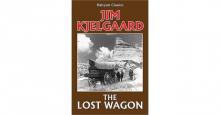 The Lost Wagon
The Lost Wagon The Spell of the White Sturgeon
The Spell of the White Sturgeon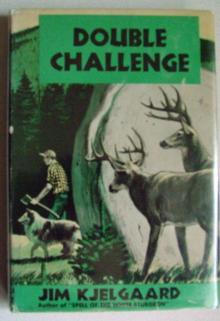 Double Challenge
Double Challenge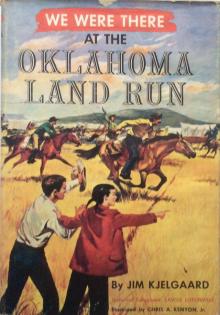 We Were There at the Oklahoma Land Run
We Were There at the Oklahoma Land Run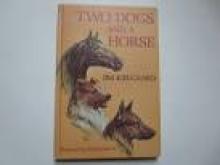 Two Dogs and a Horse
Two Dogs and a Horse The Duck-footed Hound
The Duck-footed Hound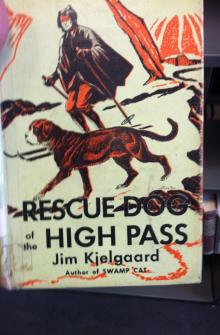 Rescue Dog of the High Pass
Rescue Dog of the High Pass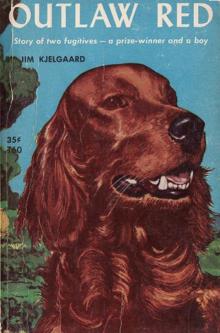 Outlaw Red
Outlaw Red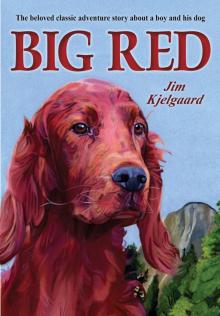 Big Red
Big Red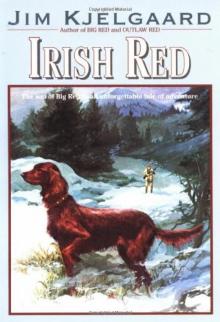 Irish Red
Irish Red